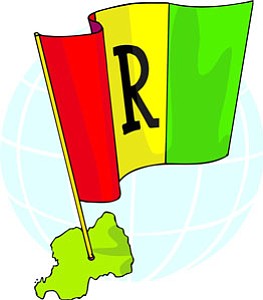As I watched President Paul Kagame take the presidential oath of office at his inauguration in Kigali on August 18, I couldn’t help but go back 23 years to a starkly different time.
My family— lucky enough to have British passports— were airlifted to safety from Kigali during the early days of the 1994 genocide against Rwanda’s Tutsi minority. I was thirteen at the time, and my family had found refuge in Hotel de Milles Collines, better known today as “Hotel Rwanda.”
If you had told me then that the country we see today was even the remotest possibility, I would have considered you delusional beyond help. The notion that I would spend a good part of my life as an adult investing and working in the country would have seemed no less far-fetched.
We left behind a failed state the world had allowed to disintegrate in an explosion of unfathomable violence. It felt as though nobody could survive what we had witnessed. As if hell had found its place on earth.
I don’t invest in Rwanda out of nostalgia, however: I do it for the same reasons that lead entrepreneurs everywhere, to new and exciting markets. Strong, growth prospects; stable governance; low levels of corruption; and a young, growing and vibrant population. Harder to quantify, but just as important, is the resilience and optimism that permeates throughout the country.
If I relied on the assessment of London- and New York-based human rights advocates and breathless newspaper editorials, I would no more invest in Rwanda than North Korea. But this is a cartoonish misrepresentation of the country, as anyone who sets foot here can see for themselves.
What I witness first-hand every day is a nation unified behind a vision of progress and inclusion. I encounter government officials committed to expanding economic opportunity by facilitating investment, eradicating corruption and building capacity among its citizens. I see a health system that has become the envy of the developing world, resulting in a doubling of life expectancy in under three decades. Of course, there is much more to do, and no room for complacency. Rwanda is a work in progress, but progress has been real and significant. This is also the case with the rest of our continent— work in progress but with real progress despite the perception being put out there.
History is littered with investments in developing markets that fall over due to an insufficient grasp of local conditions. In the absence of such hard-earned knowledge, it’s human nature to fall back on old prejudices and faulty assumptions. In business, this is fatal— and you pay a steep price. But, for critics who lob grenades at Rwanda and Africa as a whole from the safety of western capitals, there are no such consequences. In fact, the more outlandish their fictions, the greater their reach. In business, we call that a perverse incentive.
Human Rights Watch (HRW), which today more or less operates as the unofficial opposition to President Kagame, did heroic work documenting the 1994 genocide. But then, as former U.S. diplomat Richard Johnson spelled out in a book on the subject, the organization’s longtime chief, Ken Roth, became inexplicably enamored with a critique of Rwandan democracy proffered by exiled Hutu Power elites.
“HRW’s discourse on Rwanda over the past twenty years,” Johnson wrote in The Travesty of Human Rights Watch and Rwanda, “has been viscerally hostile to the Rwandan Patriotic Front (RPF) which defeated the genocidal Hutu Power regime in 1994, and systematically biased in favor of letting unrepentant Hutu Power political forces back into Rwandan political life.”
Whereas Roth’s determination to re-impose ethnic politics on Rwanda once caused anger and consternation, it barely inspires mild exasperation these days, “There he goes again” is about the sum of it.
Criticism is vital to any democracy, but overheated rhetoric and name-calling serve no useful purpose. What we ask for is fair, well-informed and balanced treatment. Look no further than the double standard evident in the reaction to Kagame seeking a third term compared to, say, Chancellor Merkel standing for her fourth. “Do what we say, not what we do” is the all too familiar catch cry.
I have several friends who support HRW along with other human rights groups, and my plea to them is this: leaders like Roth, hopelessly stuck in the past, are undermining your cause.
As any good investor would, supporters should demand factual and measured analysis from human rights groups. Meanwhile, such groups could do worse than hiring people who understand the culture, languages and political challenges facing countries in our region. They will find no shortage of willing and qualified applicants who can play a key part in transforming their sector into a genuinely global force for good.
I wrote a book, “The Lion Awakes,” about the burgeoning promise of Africa, and how outmoded narratives have held us back long enough. What we live and breathe every day is so far at odds with western portrayals of the African experience, it’s time to step up and tell our own story.
Until we do that, the disconnect between those of us who live, work and invest in Africa, and those who like to issue proclamations about the continent, will soon become an unbridgeable chasm. With my family’s history dating over a century in Africa and despite witnessing the genocide in Rwanda, I can tell you confidently and wholeheartedly— this is our time as Africa!
Entrepreneur and philanthropist Ashish J. Thakkar, author of “The Lion Awakes: Adventures in Africa’s Economic Miracle” (St. Martin’s Press, 2015), is the CEO of the Mara Group and founder of the Mara Foundation.
